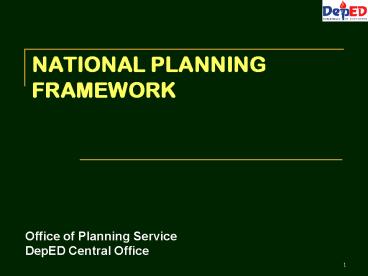NATIONAL PLANNING FRAMEWORK - PowerPoint PPT Presentation
1 / 12
Title:
NATIONAL PLANNING FRAMEWORK
Description:
NATIONAL PLANNING FRAMEWORK Office of Planning Service DepED Central Office * * a basic conceptual structure used to solve or address complex issues brings greater ... – PowerPoint PPT presentation
Number of Views:260
Avg rating:3.0/5.0
Title: NATIONAL PLANNING FRAMEWORK
1
NATIONAL PLANNING FRAMEWORK
- Office of Planning Service
- DepED Central Office
2
Why a Framework?
- a basic conceptual structure used to solve or
address complex issues - brings greater clarity, direction, and alignment
among the Departments vision, mission, and
overall priorities
3
Why Plan?
- Deciding in advance -
- What to do? Identifying objectives in relation
to problems/issues - How to do it? Activities to perform, how much
they will cost - When to do it? Timing of activities to be
undertaken - Who should do it? Assigning responsibility
centers - Establishing goals and activities and arranging
them in logical order - Estimating future costs of current policies
- Informs members of the organization
- Convinces stakeholders to buy into the
organizations goals
4
Planning Framework
(Where we want to be)
- Functionally Literate Filipinos
- Globally competitive Phil. Basic Education
- (MDG 2015, MTPDP 2010, EFA 2015)
(What we plan for)
Periodic plans with budgets
- Low quality of BE
- Under-spending in education
- Poorly managed system
(Where we are)
5
- Goal of Basic Education
- Make every Filipino functionally literate.
EFA 2001- 2015
Current Situation
BESRA 2005- 2010
MTPDP 2004-2010
6
NINE KEY TASKS TO ATTAIN EFA 2015 GOALS
- Initiate and sustain school assessment movement
- Expand targeted coverage of quality-assured ECCD
programs - Expand coverage of cost-effective adult literacy
programs - Promote practice of high quality teaching
- Add two more years to basic education cycle
7
NINE KEY TASKS TO ATTAIN EFA 2015 GOALS
- 6. Increase level and quality of effort in
curriculum development and instruction - 7. Establish new framework for public funding of
basic education - 8. Create network of community-based groups for
national and local attainment of EFA goals - 9. Establish a measurement and accountability
network
8
EFA 2015 Implementation Plans
Key Annual Plan Implementation Review to
revise/refine EFA Plans at different levels
9
Plan Contents (Conceptual)
National
Policies, Standards
Curriculum
REDP
Resources for Learning
FEEDBACKING
Quality Assurance Policies, Standards
Budgets
Public Priv. BE Prov.
Social Marketing
INSET
Payroll Servicing
? PR ? Comp. ? Achvt.
Lawyering, etc.
DEDP
? PR ? Comp. ? Achvt.
Actions to support DEDPs RMM - DEDP
? PR ? Comp. ? Achvt.
Actions to support SIPs EWB RMM - SIP
Qlty. Assurance Research
Preschool
ALS
Dist
Priv. BE Provision (qlty. assurance)
Actions to support SIPs
SIP
? Enrol. ? Comp. ? Achvt. EWB RMM
10
Guiding Principles
- Principled Engagement
- With firm understanding of the underlying
principles of the systems strategic direction
(EFA) - Allocative Efficiency
- Resources are allocated in a way that maximizes
the net benefit attained through their use. - Principle of Collaboration
- Consult and discuss to arrive good decision -
dont dictate
11
Guiding Principles
- Transparency and Accountability
- Act and decide decently and take full
responsibility - Empowerment
- Delegate functions to where it fits to where
the resource can produce the desired outcomes - OPIF and BEIS-Based Budgeting
- Data-driven decisions
12
End of Presentation































